2020年陕西高考英语试题【带答案】
2020年全国高考英语一卷试题解析

2020年全国高考英语一卷试题解析第一部分听力(共两节,满分 30 分)听力部分要求考生听懂有关日常生活中所熟悉的话题,如:问路、修理电视机、裁剪衣袖、谈论航班时间、如何改进文章、谈论周末活动、打电话取消会议、购买摄像机、采访著名插画家、陌生人之间的闲谈。
与往常相同,听力部分中有 10 段听力材料,其中的 5 段较短,另 5 段则较长。
话题覆盖面广,对话内容逻辑清楚,话语流畅。
所考查的听力微技能包括:获取事实性具体信息、对所听内容作出简单推断。
问题涉及多个方面,多个角度,采用 where-, why-, how-, who-, what- 等多种特殊疑问句。
录音人:男 Kris Chung;女 Laura Estelles口音:美音词数:864(比 2019 年 I 卷多 37 词)时间:5 分 52 秒语速:147 词/分(比 2019 年 I 卷每分钟快 14 词)难度:难度整体与 2019 年持平考点:2020 年高考英语全国卷听力的 20 个小题中,考查获取事实性具体信息的 11 个题,对所听内容作出推断的 9 个题。
第一节(Text 1)M: Excuse me. How can I get to the nearest supermarket?W: It's on Pennings Road. Go past the post office and it's on your left.(词数:24;时间:9″;语速:160 词/分)本段材料内容为问路。
1. Where does the conversation probably take place?A. In a supermarket.B. In the post office.C. In the street.【分析】考查考生对所听内容作出简单推断的能力。
男士问女士如何到达最近的超市,女士给男士指路,告诉他It's on PenningsRoad. Go past the post office and it's on your left. 由此可推断,对话最可能发生在大街上。
2020年全国卷Ⅲ英语高考试题及答案(word版)

绝密★启用前2020年普通高等学校招生全国统一考试(全国卷III)英语(全国卷Ⅲ适用地区:云南、广西、贵州、四川、西藏等地区)注意事项:1. 答卷前,考生务必将自己的姓名、准考证号填写在答题卡和试卷指定位置上。
2. 回答选择题时,选出每小题答案后,用铅笔把答题卡上对应题目的答案标号涂黑。
如需改动,用橡皮擦干净后,再选涂其他答案标号。
回答非选择题时,将答案写在答题卡上,写在本试卷上无效。
3. 考试结束后,将本试卷和答题卡一并交回。
第一部分听力(共两节,满分30分)做题时,先将答案标在试卷上。
录音内容结束后,你将有两分钟的时间将试卷上的答案转涂到答题卡上。
第一节(共5小题;每小题分,满分分)听下面5段对话。
每段对话后有一个小题,从题中所给的A、B、C三个选项中选出最佳选项。
听完每段对话后,你都有10秒钟的时间来回答有关小题和阅读下一小题。
每段对话仅读一遍。
例:How much is the shirtA. £.B. £.C. £.答案是C。
1. Where does the conversation probably take placeA. In a supermarket.B. In the post office.C. In the street.2. What did Carl doA. He designed a medal.B. He fixed a TV set.C. He took a test.3. What does the man doA. He’s a tailor.B. He’s a waiter.C. He’s a shop assistant.4. When will the flight arriveA. At 18:20.B. At 18:35.C. At 18:50.5. How can the man improve his articleA. By deleting unnecessary words.B. By adding a couple of points.C. By correcting grammar mistakes.第二节(共15小题;每小题分,满分分)听下面5段对话或独白。
2020年高考英语全国卷II试题及答案(word版)
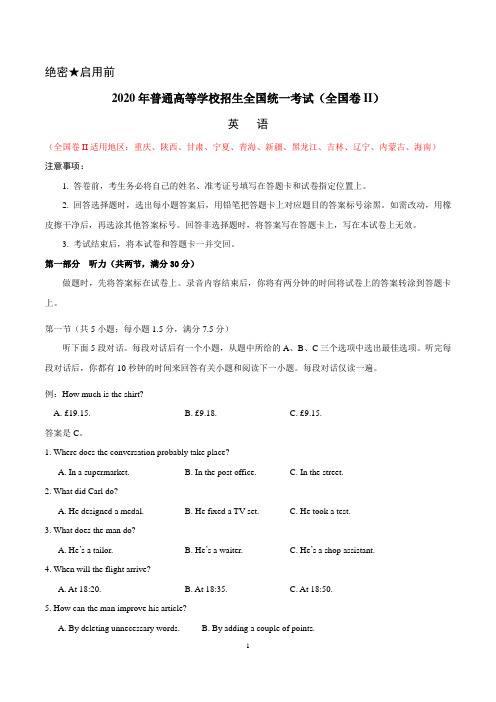
绝密★启用前2020年普通高等学校招生全国统一考试(全国卷II)英语(全国卷II适用地区:重庆、陕西、甘肃、宁夏、青海、新疆、黑龙江、吉林、辽宁、内蒙古、海南)注意事项:1. 答卷前,考生务必将自己的姓名、准考证号填写在答题卡和试卷指定位置上。
2. 回答选择题时,选出每小题答案后,用铅笔把答题卡上对应题目的答案标号涂黑。
如需改动,用橡皮擦干净后,再选涂其他答案标号。
回答非选择题时,将答案写在答题卡上,写在本试卷上无效。
3. 考试结束后,将本试卷和答题卡一并交回。
第一部分听力(共两节,满分30分)做题时,先将答案标在试卷上。
录音内容结束后,你将有两分钟的时间将试卷上的答案转涂到答题卡上。
第一节(共5小题;每小题1.5分,满分7.5分)听下面5段对话。
每段对话后有一个小题,从题中所给的A、B、C三个选项中选出最佳选项。
听完每段对话后,你都有10秒钟的时间来回答有关小题和阅读下一小题。
每段对话仅读一遍。
例:How much is the shirt?A. £19.15.B. £9.18.C. £9.15.答案是C。
1. Where does the conversation probably take place?A. In a supermarket.B. In the post office.C. In the street.2. What did Carl do?A. He designed a medal.B. He fixed a TV set.C. He took a test.3. What does the man do?A. He’s a tailor.B. He’s a waiter.C. He’s a shop assistant.4. When will the flight arrive?A. At 18:20.B. At 18:35.C. At 18:50.5. How can the man improve his article?A. By deleting unnecessary words.B. By adding a couple of points.C. By correcting grammar mistakes.第二节(共15小题;每小题1.5分,满分22.5分)听下面5段对话或独白。
2020年普通高等学校招生全国统一考试英语试题(陕西卷,含答案)

2020年普通高等学校招生全国统一考试英语试题(陕西卷,含答案)第一部分:英语知识运用(共四节,满分55分)第一节语音知识(共5小题;每小题1分。
满分5分)从每小题的A、B、C、D四个选项中,找出其划线部分与所给单词的划线部分读音相同的选项,并在答题卡上将该选项涂黑。
1.a.gain [D]A. ca.bbageB. na.rrowC. fa.mousD. tra.dition2. cus.tom [C] A. meas.ure B. ups.tairs C. res.pectD. s.ugar3. twi.ce [B]A. machi.neB. invi.teC. terri.bleD. bi.tter4. dou..bt [A]A. amou..ntB. trou..bleC. shou..lderD. grou..p5.north..[A]A. th..underB. worth..yC. neith..erD. cloth..es第二节情景对话(共5小题;每小题l分,满分5分)根据对话情景和内容,从对话后所给的选项中选出能填人每一空白处的最佳选项,并在答题卡上将该选项涂黑。
选项中有两个为多余选项。
第三节语法和词汇知识(共15小题;每小题l分,满分l5分) 从每小题的A、B、C、D四个选项中,选出可以填入空白处的最佳选项,并在答题卡上将该选项涂黑。
11. I walked up to the top of the hill with my friends, we enjoyed a splendid view of the lake.[B]A. whichB. whereC. whoD. that12. His first novel good reviews since it came out last month.[D]A. receivesB. is receivingC. will receiveD. has received13. As is known to all, People's Republic of China is biggest developing country in the world. [C]A.the;不填B.不填;theC. the; theD. 不填;不填20. More highways have been built in China, _____ it much easier for people to travelFrom one place to another. [A]A. makingB. madeC. to makeD. having made21. --We can give you a ride into town.-- Thank you.[D]A. Yes, why not?B. Oh, it would be my pleasure.C. Yes, please.D. Oh, that would be great.22. I ____ through that bitter period without your generous help.[A]A. couldn't have goneB. didn't goC. wouldn't goD. hadn't gone第四节完形填空(共20小题;每小题1.5分,满分30分)阅读下面短文,从短文后各题的A,B,C,D四个选项中,选出合适填入对应空白处的最佳选项,并在答题卡上将该选项涂黑。
2020年全国卷Ⅲ英语高考试题及答案(word版)
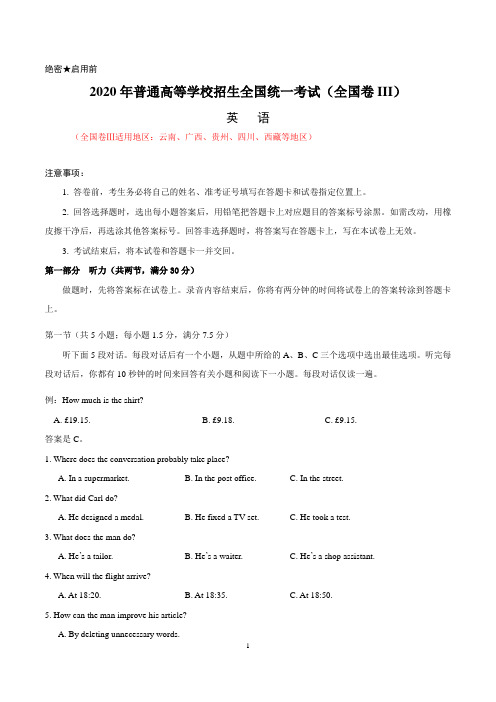
绝密★启用前2020年普通高等学校招生全国统一考试(全国卷III)英语(全国卷Ⅲ适用地区:云南、广西、贵州、四川、西藏等地区)注意事项:1. 答卷前,考生务必将自己的姓名、准考证号填写在答题卡和试卷指定位置上。
2. 回答选择题时,选出每小题答案后,用铅笔把答题卡上对应题目的答案标号涂黑。
如需改动,用橡皮擦干净后,再选涂其他答案标号。
回答非选择题时,将答案写在答题卡上,写在本试卷上无效。
3. 考试结束后,将本试卷和答题卡一并交回。
第一部分听力(共两节,满分30分)做题时,先将答案标在试卷上。
录音内容结束后,你将有两分钟的时间将试卷上的答案转涂到答题卡上。
第一节(共5小题;每小题1.5分,满分7.5分)听下面5段对话。
每段对话后有一个小题,从题中所给的A、B、C三个选项中选出最佳选项。
听完每段对话后,你都有10秒钟的时间来回答有关小题和阅读下一小题。
每段对话仅读一遍。
例:How much is the shirt?A. £19.15.B. £9.18.C. £9.15.答案是C。
1. Where does the conversation probably take place?A. In a supermarket.B. In the post office.C. In the street.2. What did Carl do?A. He designed a medal.B. He fixed a TV set.C. He took a test.3. What does the man do?A. He’s a tailor.B. He’s a waiter.C. He’s a shop assistant.4. When will the flight arrive?A. At 18:20.B. At 18:35.C. At 18:50.5. How can the man improve his article?A. By deleting unnecessary words.B. By adding a couple of points.C. By correcting grammar mistakes.第二节(共15小题;每小题1.5分,满分22.5分)听下面5段对话或独白。
2020年高考全国Ⅰ卷英语试题听力部分(含听力音频、听力原文和答案)
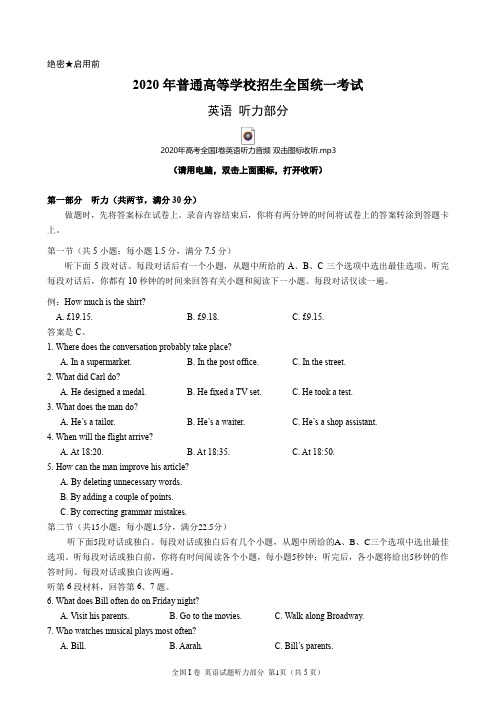
绝密★启用前2020年普通高等学校招生全国统一考试英语听力部分2020年高考全国I卷英语听力音频 双击图标收听.mp3(请用电脑,双击上面图标,打开收听)第一部分听力(共两节,满分30分)做题时,先将答案标在试卷上。
录音内容结束后,你将有两分钟的时间将试卷上的答案转涂到答题卡上。
第一节(共5小题;每小题1.5分,满分7.5分)听下面5段对话。
每段对话后有一个小题,从题中所给的A、B、C三个选项中选出最佳选项。
听完每段对话后,你都有10秒钟的时间来回答有关小题和阅读下一小题。
每段对话仅读一遍。
例:How much is the shirt?A. £19.15.B. £9.18.C. £9.15.答案是C。
1. Where does the conversation probably take place?A. In a supermarket.B. In the post office.C. In the street.2. What did Carl do?A. He designed a medal.B. He fixed a TV set.C. He took a test.3. What does the man do?A. He’s a tailor.B. He’s a waiter.C. He’s a shop assistant.4. When will the flight arrive?A. At 18:20.B. At 18:35.C. At 18:50.5. How can the man improve his article?A. By deleting unnecessary words.B. By adding a couple of points.C. By correcting grammar mistakes.第二节(共15小题;每小题1.5分,满分22.5分)听下面5段对话或独白。
2020年普通高等学校招生全国统一考试英语(陕西卷,含答案)

2020年普通高等学校招生全国统一考试英语(陕西卷,含答案)一、英语知识运用(共三大题, 满分50分)(一)语音知识(共5小题, 每小题1分, 满分5分)从每小题的A. B. C. D四个选项中, 找出其划线部分与所给单词的划线部分读音相同的选项, 并在答题卡上将该选项涂黑。
1. permi.tA. fistB. behindC. islandD. smile2. questionA. revolutionB. exhibitionC. suggestionD. education3. emptyA. toilerB. dozenC. generalD. connect4. socialA. preciousB. certainC. discoveryD. decision5. forgetA. ordinaryB. majorC. worldD. report(二)语法和词汇知识(共15小题, 每小题1分, 满分15分)从每小题的A. B. C. D四个选项中, 选出可以填入空白处的最佳选项, 并在答题卡上将该选项涂黑。
6. What pit y that you couldn’t be there to receive prize!A. a; aB. the ; aC. a ; theD. the; the7. Dr. Smith, together with his wife and daughters, visit Beijing this summer.A. is going toB. are going toC. was going toD. were going to8. He invited me to a dance after the show Christmas Eve.A. atB. onC. inD. by9. This is the first time went a film in the cinema together as a family.A. seeB. had seenC. sawD. have seen10. Jane was asked a lot of questions, but she didn’t answer of them.A. otherB. anyC. noneD. some11. Gun control is a subject Americans have argued for a long time.A. of whichB. with whichC. about whichD. into which12. I still remember to the Famen Temple and what I saw there.A. to takeB. to be takenC. takingD. being taken13. My parents don’t mind what job I do I am happy. A. even thoughB. as soon asC. as long asD. as though14. —My mother is preparing my favorite dishes. Go with me and have a taste, okay?-- . And I’ll be glad to meet your parents.A. I think soB. I’d love toC. I’m sureD. I hope so15. A. notice was in order to remind the students of the changed lecture time.A. sent upB. given upC. set upD. put up16. He must be helping the old man to water the flowers, ? A.is he B. isn’t he C. must he D. mustn’t he17. The how to book can be of help to wants to do the job.A. whoB. whomeverC. no matter whoD. whoever18. Little about her own safety, though she was in great danger herself. A. did Rose care B. Rose did care C. Rose does care D.does Rose care19. —Have you finished your first paper? -- . Justhalf of it. How about you?A. Not at allB. Not likelyC. Not a bitD. Not yet20. Form their ________ on the top of the TV Tower, visitors can havea better view of the city.A. stageB. positionC. conditionD. situation(三)完形填空(共20小题, 每小题1. 5分, 满分30分)阅读下面短文, 从短文后面各题的A、B、C、D四个选项中, 选出适合填入对应空白处的最佳选项, 并在答题卡上将该选项涂黑。
2020年高考英语全国卷II短文改错试题及答案详解
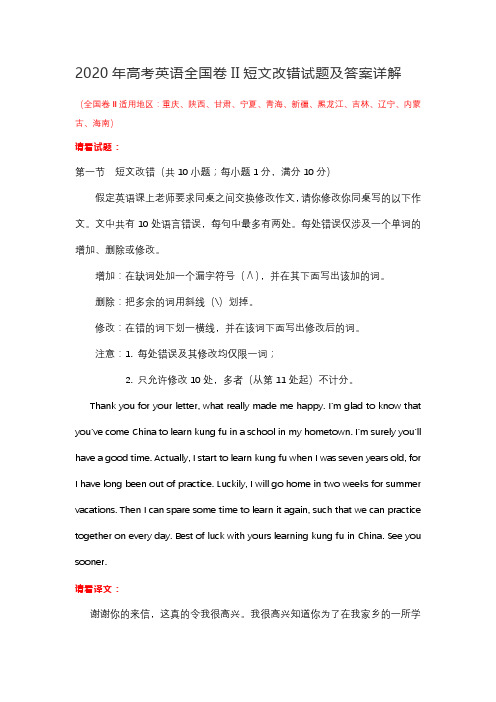
2020年高考英语全国卷II短文改错试题及答案详解(全国卷II适用地区:重庆、陕西、甘肃、宁夏、青海、新疆、黑龙江、吉林、辽宁、内蒙古、海南)请看试题:第一节短文改错(共10小题;每小题1分,满分10分)假定英语课上老师要求同桌之间交换修改作文,请你修改你同桌写的以下作文。
文中共有10处语言错误,每句中最多有两处。
每处错误仅涉及一个单词的增加、删除或修改。
增加:在缺词处加一个漏字符号(∧),并在其下面写出该加的词。
删除:把多余的词用斜线(\)划掉。
修改:在错的词下划一横线,并在该词下面写出修改后的词。
注意:1. 每处错误及其修改均仅限一词;2. 只允许修改10处,多者(从第11处起)不计分。
Thank you for your letter, what really made me happy. I’m glad to know that you’ve come China to learn kung fu in a school in my hometown. I’m surely you’ll have a good time. Actually, I start to learn kung fu when I was seven years old, for I have long been out of practice. Luckily, I will go home in two weeks for summer vacations. Then I can spare some time to learn it again, such that we can practice together on every day. Best of luck with yours learning kung fu in China. See you sooner.请看译文:谢谢你的来信,这真的令我很高兴。
2020年高考英语全国卷II语法填空试题及答案详解
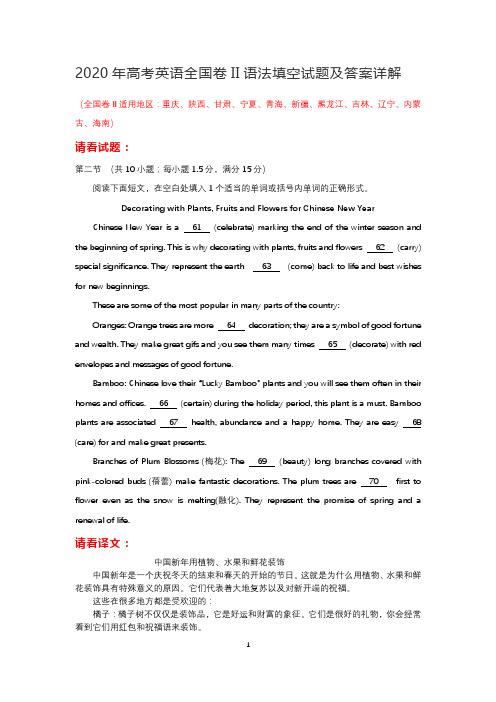
2020年高考英语全国卷II语法填空试题及答案详解(全国卷II适用地区:重庆、陕西、甘肃、宁夏、青海、新疆、黑龙江、吉林、辽宁、内蒙古、海南)请看试题:第二节(共10小题;每小题1.5分,满分15分)阅读下面短文,在空白处填入1个适当的单词或括号内单词的正确形式。
Decorating with Plants, Fruits and Flowers for Chinese New Year Chinese New Year is a 61 (celebrate) marking the end of the winter season and the beginning of spring. This is why decorating with plants, fruits and flowers 62 (carry) special significance. They represent the earth 63 (come) back to life and best wishes for new beginnings.These are some of the most popular in many parts of the country:Oranges: Orange trees are more 64 decoration; they are a symbol of good fortune and wealth. They make great gifs and you see them many times 65 (decorate) with red envelopes and messages of good fortune.Ba mboo: Chinese love their “Lucky Bamboo” plants and you will see them often in their homes and offices. 66 (certain) during the holiday period, this plant is a must. Bamboo plants are associated 67 health, abundance and a happy home. They are easy 68 (care) for and make great presents.Branches of Plum Blossoms (梅花): The 69 (beauty) long branches covered with pink-colored buds (蓓蕾) make fantastic decorations. The plum trees are 70 first to flower even as the snow is melting(融化). They represent the promise of spring and a renewal of life.请看译文:中国新年用植物、水果和鲜花装饰中国新年是一个庆祝冬天的结束和春天的开始的节日。
2020年陕西省高考英语模拟试题与答案

2020年陕西省高考英语模拟试题与答案本试卷满分150分,考试时间120分钟。
注意事项:1.答卷前,考生务必将自己的姓名、准考证号等信息填写在答题卡和试卷指定位置上。
2.回答选择题时,选出每小题答案后,用铅笔把答题卡上对应题目的答案标号涂黑。
如需改动,用橡皮擦干净后,再选涂其他答案标号。
回答非选择题时,将答案写在答题卡上,写在本试卷上无效。
3.考试结束,考生将本试卷和答题卡一并交回。
第一部分听力(共两节,满分30分)(略)第二部分阅读理解(共两节,满分40分)第一节(共15小题;每小题2分,满分30分)阅读下列短文,从每题所给的A、B、C和D四个选项中,选出最佳选项。
AYou might have heard a lot about ancient towns and ancient cities in China. Here, we list several of the most beautiful ancient villages in China.Baoshan Stone City, Yunnan ProvinceBaoshan Stone City was built on a huge mushroom-shaped rock, and only has about one hundred houses. The houses are laid out in an orderly way, built on the rock, and linked by stone steps. The Naxi people there still lead an original life and grow crops in terraces (梯田); you can experience the colorful culture of the Naxi ethnic (民族的) group there.Tuvas Village in Kanas, XinjiangKanas Tuvas Village is near the mysterious Lake Kanas. The small village is located in a valley, and only has about 80 houses. These Swiss-style wooden houses are all surrounded by wooden fences. Tuvas is an ancient minority group. They traditionally lived as hunter-gathers. You can visit a local family, go herding (放牧) with the locals and experience the peaceful ancient village life.Jiaju Tibetan Village, Danba, Sichuan ProvinceJiaju Tibetan Village is known as the “Tibetan fairyland”. It stands on a mountain slope, and consists of about 140 houses. These unique houses are all built with crown-shaped roofs, red eaves, and white walls, which make the houses look like little castles among the forest.Xijiang Miao Village, Guizhou ProvinceIf you re interested in the Miao Minority, Xijiang Miao Village can be a great destination for deepening your understanding of Miao history and culture. It’s the largest Mi ao village in China, and now has 1432 households with a population of over 5000, of which 99.5% are Miao ethnic group. It’ s also famous for the houses built on stilts (支柱) of different heights.1. What can you do in Kanas Tuvas Village?A. Hike in terraces.B. See houses of a foreign style.C. Go hunting with the locals.D. Learn about houses built on stilts.2. Where can you admire the houses like castles?A. In Baoshan Stone City.B. In Kanas Tuvas Village.C. In Jiaju Tibetan Village.D. In Xijiang Miao Village.3. What can we infer about the villages mentioned in the text?A. They remained secret to the outside world in the past.B. They were originally built to defend their homeland.C. They are still cut off and difficult to access nowadays.D. They are the ethnic villages with unique architecture.BI was in the seventh grade, and we had moved to New Jersey in November. By then, everyone already had had their own friends, and no one wanted to talk to a new girl. To make things worse, they put me in “Section L”. I found out later that everyone called Section L “Loserville”. It was sort of an open secret that it was the section for troublemakers and not-so-smart kids. When I found out, I wanted to scream. I had always been a good student and had amazing friends, and now everyone thought I was a loser!I did text my friends in Illinois almost every night, especially my best friend, Ana. At first my friends wanted to hear all about it. But then some stopped texting back once I said something about how miserable I was. One night when I was texting with Ana, I complained about another friend who had just done that.Ana’s texts came really fast for the next few minutes and they surprised me. She said that she was tired of hearing about how bad everything was in New Jersey, too. She said she did not want to hurt my feelings but that I needed to stop feeling so sorry for myself all the time, I had to try to make things better.The next day, I thought a lot about what Ana had said. She was right!I wish I could say that everything changed overnight after that, but it didn’t. I was still stuck in “Loserville”, and some people were still mean to me, even though I tried to just stay out of their way.But what did change was me—I stopped feeling so sorry for myself and did something about making friends. I signed up to make sets for the school play. I met a lot of new people there, and suddenly I had friends to say hi to in the halls!I still miss Illinois sometimes, but life in New Jersey isn’t so hard anymore. Even though I couldn’t change my situation, I could change my attitude—and that made all the difference.4. “Loserville” is a section for ________.A. failuresB. good studentsC. class secretsD. newcomers5. The writer complained all the time in the new environment because ________.A. Ana didn’t text back to herB. her friends hurt her feelingsC. she was unfairly treatedD. she was a good student6. What made a difference in changing the situation?A. She went back to Illinois.B. She ended friendship with Ana.C. She fought back with her classmates.D. She began to make friends with others.7. The best title for the passage can be ________.A. Lasting FriendshipB. An Incidence at SchoolC. Say Goodbye to “Loserville”D. Unhappiness in “Loserville”CMoscow city authorities have begun using comics(漫画)with characters from Russian fairy tales to explain to migrants(移民)how they should behave. They say a 100-page guide is needed to "keep a positive image" of the city and could help reduce "tensions" between natives and migrants. But critics have pointed out that foreign migrants and natives may be regarded as antagonists in the manual(手册).Russians and migrants have repeatedly flooded in Moscow recently. Many migrants from ex-Soviet republics in Central Asia, the Caucasus(高加索)and North Caucasus, arrive in Moscow every year, attracted by the capital’s job opportunities and relatively high salaries. A significant number of them workin the Russian capital illegally.The new guide in Russian seeks to explain the "dos" and "don’ts" to migrants. They are urged not to cause trouble, by staring at women, or eating or talking loudly on the streets. They are also warned that the police may routinely(例行公事)stop them to check their documents.In the manual, Russia’s famous "three warriors" are meant to represent the city’s law enforcement agencies(执法机关), while Prince Y uri Dolgoruky (a historical character) is used for tours around Moscow. Meanwhile, Vasilisa the Wise and The Snow Maiden test the reader on Russia’s language a nd history. A special section of the book explains the importance of following Moscow’s strict residency and employment rules, stressing that migrants could otherwise be deported(驱逐出境) or banned from entry.The manual was written primarily for illegal migrants, Alexander Kalinin, who heads the group Support for Working Migrants in Moscow, told BBC Russian."We want to raise their level of law awareness," he added.Migrant characters had initially(最初) been identified as representatives of different nationalities, but the book’s authors later decided to drop this idea so as "not to offend anyone", said Mr. Kalinin."The old conflict between Russian heroes and non-Slavic invaders is being revived," Yevgeny Varshaver, a migration expert told BBC Russian. He also suggested that the language used in the book would be "difficult" to understand for some migrants who were not native Russian speakers.8. The underlined word "antagonists" in Paragraph 1 can probably be replaced by "_____".A. friendsB. acquaintancesC. cooperatorsD. opponents9. People from other countries come to Moscow "_____"A. to find well-paid jobsB. to have a new lifestyleC. to enjoy the fine climateD. to experience a new culture10. The third paragraph is mainly about"_____".A. consequences the migrants may sufferB. the purpose of publishing the handbookC. the measures to attract foreign migrantsD. characters and their functions in Russian fairytales11. Which of the following would be the best title of the text?A. Ways to help foreign migrants to settle in RussiaB. Characters from Russian fairy tales have new jobsC. More and more foreign migrants to work in MoscowD. Moscow fairy tale comics to help migrants behaveDIn this Pennsylvania city, Pittsburgh is shrinking but getting wealthier. Since 2000, its population has declined by 95,000 while its income per capita (人均) has shot up 24 percent. The trend is taking hold in many other cities, like Buffalo in New York, Providence in Rhode Island and New Orleans.Some of these areas have created more high-paying jobs in energy, health care or education. Others have managed to reshape their producing industry for a new economy. Higher-paying jobs have a greater effect because they create demand for additional services. "The story in Pittsburgh is very positive, and other areas are looking at it as an example of the transformation that might be possible,”said Guhan Venkatu, who wrote an economic history of the area called “Rust and Renewal” for the Federal Reserve Bank of Cleveland.Carnegie Mellon University and the University of Pittsburgh have helped bring tech jobs and innovation(革新) to the area by sponsoring tech centers that help graduates start companies without moving to Silicon Valley or San Francisco. This has helped keep Pittsburgh's educated young population growing even as the entire population in the city has dropped.Pittsburgh has more STEM (science, technology, engineering and math) jobs than other shrinking cities, about 80, 000 or 7% of all jobs. STEM jobs add productivity and income growth to the area. Manufacturers of high-tech medical equipment in the Pittsburgh area also have doubled employment in the last 10 years.However, some experts question whether growing income per capita can really make up for a declining population. According to Patrick Adler, a researcher at the University of Toronto, population loss does matter if it means lower-skilled workers have fled because of a lack of opportunity. What's more, high-paying jobs in education and health care can disappear if the population declines too greatly. So it'd be wise to find ways to increase the population.12. In what aspect does Pittsburgh set a good example?A. Transforming old energy into new energy.B. Creating more well-paid jobs.C. Prohibiting the manufacturing.D. Sponsoring higher education.13. How do some academic institutions help with the local economy?A. By helping to attract more talents from other areas.B. By providing much technical support to local companies.C. By hosting tech centers for local educated graduates.D. By assisting in employing a large number of educated youths.14. Why is Patrick Adler mentioned in the last paragraph?A. To show the disadvantage of a declining population.B. To suggest increasing high-paying jobs.C. To raise doubts about growing income per capita.D. To tell a reason why lower-skilled workers flee.15. What can be a suitable title for the text?A. How Fast Job Growth Is Related to Population GrowthB. How Less-crowded Cities Plan Their High-tech EconomyC. Why Some Cities Are Losing People but Getting WealthierD. Why Some Cities Are Suffering From a Shrinking Population第二节(共5小题;每小题2分,满分10分)根据短文内容,从短文后的选项中选出能填入空白处的最佳选项。
(精编)2020年高考英语试卷(全国新高考Ⅰ卷)含答案
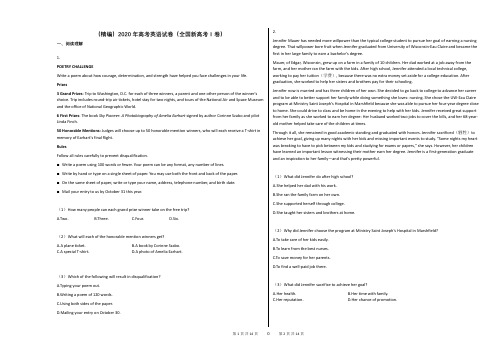
(精编)2020年高考英语试卷(全国新高考Ⅰ卷)一、阅读理解1.POETRY CHALLENGEWrite a poem about how courage, determination, and strength have helped you face challenges in your life.Prizes3 Grand Prizes: Trip to Washington, D.C. for each of three winners, a parent and one other person of the winner's choice. Trip includes round-trip air tickets, hotel stay for two nights, and tours of the National Air and Space Museum and the office of National Geographic World.6 First Prizes: The book Sky Pioneer: A Photobiography of Amelia Earhart signed by author Corinne Szabo and pilot Linda Finch.50 Honorable Mentions: Judges will choose up to 50 honorable mention winners, who will each receive a T-shirt in memory of Earhart's final flight.RulesFollow all rules carefully to prevent disqualification.■ Write a poem using 100 words or fewer. Your poem can be any format, any number of lines.■ Write by hand or type on a single sheet of paper. You may use both the front and back of the paper.■ On the same sheet of paper, write or type your name, address, telephone number, and birth date.■ Mail your entry to us by October 31 this year.(1)How many people can each grand prize winner take on the free trip?A.Two.B.Three.C.Four.D.Six.(2)What will each of the honorable mention winners get?A.A plane ticket.B.A book by Corinne Szabo.C.A special T-shirt.D.A photo of Amelia Earhart.(3)Which of the following will result in disqualification?A.Typing your poem out.B.Writing a poem of 120 words.ing both sides of the paper.D.Mailing your entry on October 30. 2.Jennifer Mauer has needed more willpower than the typical college student to pursue her goal of earning a nursing degree. That willpower bore fruit when Jennifer graduated from University of Wisconsin-Eau Claire and became the first in her large family to earn a bachelor's degree.Mauer, of Edgar, Wisconsin, grew up on a farm in a family of 10 children. Her dad worked at a job away from the farm, and her mother ran the farm with the kids. After high school, Jennifer attended a local technical college, working to pay her tuition(学费), because there was no extra money set aside for a college education. After graduation, she worked to help her sisters and brothers pay for their schooling.Jennifer now is married and has three children of her own. She decided to go back to college to advance her career and to be able to better support her family while doing something she loves: nursing. She chose the UW-Eau Claire program at Ministry Saint Joseph's Hospital in Marshfield because she was able to pursue her four-year degree close to home. She could drive to class and be home in the evening to help with her kids. Jennifer received great support from her family as she worked to earn her degree: Her husband worked two jobs to cover the bills, and her 68-year-old mother helped take care of the children at times.Through it all, she remained in good academic standing and graduated with honors. Jennifer sacrificed(牺牲)to achieve her goal, giving up many nights with her kids and missing important events to study. "Some nights my heart was breaking to have to pick between my kids and studying for exams or papers," she says. However, her children have learned an important lesson witnessing their mother earn her degree. Jennifer is a first-generation graduate and an inspiration to her family—and that's pretty powerful.(1)What did Jennifer do after high school?A.She helped her dad with his work.B.She ran the family farm on her own.C.She supported herself through college.D.She taught her sisters and brothers at home.(2)Why did Jennifer choose the program at Ministry Saint Joseph's Hospital in Marshfield?A.To take care of her kids easily.B.To learn from the best nurses.C.To save money for her parents.D.To find a well-paid job there.(3)What did Jennifer sacrifice to achieve her goal?A.Her health.B.Her time with family.C.Her reputation.D.Her chance of promotion.(4)What can we learn from Jennifer's story?A.Time is money.B.Love breaks down barriers.C.Hard work pays off.cation is the key to success.3.In the mid-1990s, Tom Bissell taught English as a volunteer in Uzbekistan. He left after seven months, physically broken and having lost his mind. A few years later, still attracted to the country, he returned to Uzbekistan to write an article about the disappearance of the Aral Sea.His visit, however, ended up involving a lot more than that. Hence this book, Chasing the Sea: Lost Among the Ghosts of Empire in Central Asia, which talks about a road trip from Tashkent to Karakalpakstan, where millions of lives have been destroyed by the slow drying up of the sea. It is the story of an American travelling to a strange land, and of the people he meets on his way: Rustam, his translator, a lovely 24-year-old who picked up his colorful English in California, Oleg and Natasha, his hosts in Tashkent, and a string of foreign aid workers.This is a quick look at life in Uzbekistan, made of friendliness and warmth, but also its darker side of society. In Samarkand, Mr Bissell admires the architectural wonders, while on his way to Bukhara he gets a taste of police methods when suspected of drug dealing. In Ferghana, he attends a mountain funeral(葬礼)followed by a strange drinking party. And in Karakalpakstan, he is saddened by the dust storms, diseases and fishing boats stuck miles from the sea.Mr Bissell skillfully organizes historical insights and cultural references, making his tale a well-rounded picture of Uzbekistan, seen from Western eyes. His judgment and references are decidedly American, as well as his delicate stomach. As the author explains, this is neither a travel nor a history book, or even a piece of reportage. Whatever it is, the result is a fine and vivid description of the purest of Central Asian traditions.(1)What made Mr Bissell return to Uzbekistan?A.His friends' invitation.B.His interest in the country.C.His love for teaching.D.His desire to regain health.(2)What does the underlined word "that" in paragraph 2 refer to?A.Developing a serious mental disease.B.Taking a guided tour in Central Asia.C.Working as a volunteer in Uzbekistan.D.Writing an article about the Aral Sea.(3)Which of the following best describes Mr Bissell's road trip in Uzbekistan?A.Romantic.B.Eventful.C.Pleasant.D.Dangerous. (4)What is the purpose of this text?A.To introduce a book.B.To explain a cultural phenomenon.C.To remember a writer.D.To recommend a travel destination.4.According to a recent study in the Journal of Consumer Research, both the size and consumption habits of our eating companions can influence our food intake. And contrary to existing research that says you should avoid eating with heavier people who order large portions (份), it's the beanpoles with big appetites you really need to avoid.To test the effect of social influence on eating habits, the researchers conducted two experiments. In the first, 95 undergraduate women were individually invited into a lab to ostensibly (表面上) participate in a study about movie viewership. Before the film began, each woman was asked to help herself to a snack. An actor hired by the researchers grabbed her food first. In her natural state, the actor weighed 105 pounds. But in half the cases she wore a specially designed fat suit which increased her weight to 180 pounds.Both the fat and thin versions of the actor took a large amount of food. The participants followed suit, taking more food than they normally would have. However, they took significantly more when the actor was thin.For the second test, in one case the thin actor took two pieces of candy from the snack bowls. In the other case, she took 30 pieces. The results were similar to the first test: the participants followed suit but took significantly more candy when the thin actor took 30 pieces.The tests show that the social environment is extremely influential when we're making decisions. If this fellow participant is going to eat more, so will I. Call it the "I'll have what she's having" effect. However, we'll adjust the influence. If an overweight person is having a large portion, I'll hold back a bit because I see the results of his eating habits. But if a thin person eats a lot, I'll follow suit. If he can eat much and keep slim, why can't I?(1)What is the recent study mainly about?A.Food safety.B.Movie viewership.C.Consumer demand.D.Eating behavior.(2)What does the underlined word "beanpoles" in paragraph 1 refer to?A.Big eaters.B.Overweight persons.C.Picky eaters.D.Tall thin persons.(3)Why did the researchers hire the actor?A.To see how she would affect the participants.B.To test if the participants could recognize her.C.To find out what she would do in the two tests.D.To study why she could keep her weight down.(4)On what basis do we "adjust the influence" according to the last paragraph?A.How hungry we are.B.How slim we want to be.C.How we perceive others.D.How we feel about the food.二、七选五5. 阅读下面短文,从短文后的选项中选出可以填入空白处的最佳选项。
2020年全国1卷高考试题英语有解析

年普通高等学校招生全国统一考试(全国卷I)英语注意事项:答卷前,考生务必将自己的姓名、准考证号填写在答题卡和试卷指定位置上。
回答选择题时,选出每小题答案后,用铅笔把答题卡上对应题目的答案标号涂黑。
如需改动,用橡皮擦干净后,再选涂其答案标号。
回答非选择题时,将答案写在答题卡上,写在本试卷上无效。
考试结束后,将本试卷和答题卡一并交回。
第一部分听力(共两节,满分30分)做题时,先将答案标在试卷上。
录音内容结束后,你将有两分钟的时间将试卷上的答案转涂到答题卡上。
第一节(共5小题;每小题5分,满分5分)听下面5段对话。
每段对话后有一个小题,从题中所给的A、B、C三个选项中选出最佳选项。
听完每段对话后,你都有10秒钟的时间来回答有关小题和阅读下一小题。
每段对话仅读一遍。
例:How much is the shirt?A. £11B. £1C. £1答案是C。
Where are the speakers?A. At a swimming pool. B. In a clothing shop. C. At a school lab.【答案】B【解析】【原文】本题为听力题,解析略。
What will Tom do next?A. Turn down the music. B. Postpone the show.C. Stop practicing.【答案】C【解析】【原文】本题为听力题,解析略。
What is the woman busy doing?A. Working on a paper.B. Tidying up the office.C. Organizing a party.【答案】C【解析】【原文】本题为听力题,解析略。
When will Henry start his vacation?A. This weekend. B. Next week. C. At the end of August.【答案】A【解析】【原文】本题为听力题,解析略。
2020年陕西高考英语试题(含答案)

2020年陕西高考英语试题及答案注意事项:1. 答卷前,考生务必将自己的姓名、准考证号填写在答题卡和试卷指定位置上。
2. 回答选择题时,选出每小题答案后,用铅笔把答题卡上对应题目的答案标号涂黑。
如需改动,用橡皮擦干净后,再选涂其他答案标号。
回答非选择题时,将答案写在答题卡上,写在本试卷上无效。
3. 考试结束后,将本试卷和答题卡一并交回。
第一部分听力(共两节,满分30分)做题时,先将答案标在试卷上。
录音内容结束后,你将有两分钟的时间将试卷上的答案转涂到答题卡上。
第一节(共5小题;每小题1.5分,满分7.5分)听下面5段对话。
每段对话后有一个小题,从题中所给的A、B、C三个选项中选出最佳选项。
听完每段对话后,你都有10秒钟的时间来回答有关小题和阅读下一小题。
每段对话仅读一遍。
例:How much is the shirt?A. £19.15.B. £9.18.C. £9.15.答案是C。
1. Where does the conversation probably take place?A. In a supermarket.B. In the post office.C. In the street.2. What did Carl do?A. He designed a medal.B. He fixed a TV set.C. He took a test.3. What does the man do?A. He’s a tailor.B. He’s a waiter.C. He’s a shop assistant.4. When will the flight arrive?A. At 18:20.B. At 18:35.C. At 18:50.5. How can the man improve his article?A. By deleting unnecessary words.B. By adding a couple of points.C. By correcting grammar mistakes.第二节(共15小题;每小题1.5分,满分22.5分)听下面5段对话或独白。
2020年高考英语试题全国卷Ⅰ(word版,有答案)

绝密★启用前2020年普通高等学校招生全国统一考试(全国卷I)英语注意事项:1. 答卷前,考生务必将自己的姓名、准考证号填写在答题卡和试卷指定位置上。
2. 回答选择题时,选出每小题答案后,用铅笔把答题卡上对应题目的答案标号涂黑。
如需改动,用橡皮擦干净后,再选涂其他答案标号。
回答非选择题时,将答案写在答题卡上,写在本试卷上无效。
3. 考试结束后,将本试卷和答题卡一并交回。
版本一(适用地区:河南、山西)第一部分听力(共两节,满分30分)做题时,先将答案标在试卷上。
录音内容结束后,你将有两分钟的时间将试卷上的答案转涂到答题卡上。
第一节(共5小题;每小题1.5分,满分7.5分)听下面5段对话。
每段对话后有一个小题,从题中所给的A、B、C三个选项中选出最佳选项。
听完每段对话后,你都有10秒钟的时间来回答有关小题和阅读下一小题。
每段对话仅读一遍。
例:How much is the shirt?A. £19.15.B. £9.18.C. £9.15.答案是C。
1. Where are the speakers?A. At a swimming pool.B. In a clothing shop.C. At a school lab.2. What will Tom do next?A. Turn down the music.B. Postpone the show.C. Stop practicing.3. What is the woman busy doing?A. Working on a paper.B. Tidying up the office.C. Organizing a party.4. When will Henry start his vacation?A. This weekend.B. Next week.C. At the end of August.5. What does Donna offer to do for Bill?A. Book a flight for him.B. Drive him to the airport.C. Help him park the car.第二节(共15小题;每小题1.5分,满分22.5分)听下面5段对话或独白。
2020年高考英语全国卷II语法填空试题及答案详解

2020年高考英语全国卷II语法填空试题及答案详解(全国卷II适用地区:重庆、陕西、甘肃、宁夏、青海、新疆、黑龙江、吉林、辽宁、内蒙古、海南)请看试题:第二节(共10小题;每小题1.5分,满分15分)阅读下面短文,在空白处填入1个适当的单词或括号内单词的正确形式。
Decorating with Plants, Fruits and Flowers for Chinese New Year Chinese New Year is a 61 (celebrate) marking the end of the winter season and the beginning of spring. This is why decorating with plants, fruits and flowers 62 (carry) special significance. They represent the earth 63 (come) back to life and best wishes for new beginnings.These are some of the most popular in many parts of the country:Oranges: Orange trees are more 64 decoration; they are a symbol of good fortune and wealth. They make great gifs and you see them many times 65 (decorate) with red envelopes and messages of good fortune.Ba mboo: Chinese love their “Lucky Bamboo” plants and you will see them often in their homes and offices. 66 (certain) during the holiday period, this plant is a must. Bamboo plants are associated 67 health, abundance and a happy home. They are easy 68 (care) for and make great presents.Branches of Plum Blossoms (梅花): The 69 (beauty) long branches covered with pink-colored buds (蓓蕾) make fantastic decorations. The plum trees are 70 first to flower even as the snow is melting(融化). They represent the promise of spring and a renewal of life.请看译文:中国新年用植物、水果和鲜花装饰中国新年是一个庆祝冬天的结束和春天的开始的节日。
2020年普通高等学校招生全国统一考试英语试题(陕西卷,解析版)(2)

2020年普通高等学校招生全国统一考试(陕西卷)英语试题解析第一部分:英语知识运用(共四节,满分55分)语音知识(共5小题;每小题1分,满分5分)从每小题的A、B、C、D四个选项中,找出其划线部分与所给单词的划线部分读音相同的选项,并在答题卡上将该选项涂黑。
1. openA. becomeB. acrossC. lonelyD. balcony2. teacherA. greatB. heavyC. ideaD. disease3. physicsA. pleasureB. musicC. sureD. increase4. weatherA. warmthB. methodC. theoryD. breathe5. brownA. howeverB. sorrowC. knowledgeD. owner第二节情景对话(共5小题;每小题1分,满分5分)根据对话情境和内容,从对话后所给的选项中选出能填入每一空白处的最佳选项,并在答题卡上将该选项涂黑。
选项中有两个为多余选项。
Linda: Hello, George. 6George: Hi, Linda. I’m reading a tourist guide to Europe.Linda: 7George: Yes, i’m looking to such a trip. Hey, have you ever been there? Linda: Yes. I’ve actually visited my countries in Europe; France, Germany, Italy and Austria, for example.George: 8 And how long did you stay?Linda: Two years ago. For over one month.George: Did you like it?Linda: 9 There are many ancient churches and castles. It’s the best trip I’ve ever taken.George: Sounds great. 10Linda: Good idea. You won’t regret it.A: Of course.B: Not exactly.C: What are you doing?D: When did you go there?E: Do you plan to move to Europe?F: Are you thinking of visiting Europe some day?G: I decide to make a trip next October on my annual leave.第三节语法和词汇知识(共15小题;每小题1分,满分15分)从每小题的A、B、C、D四个选项中,选出可以填入空白处的最佳选项,并在答题卡上将该选项涂黑。
